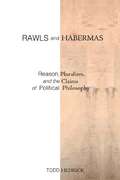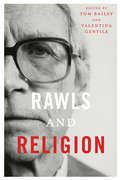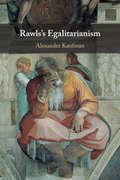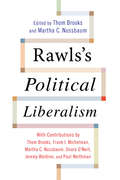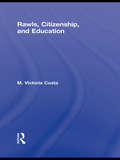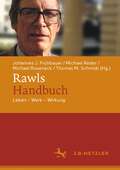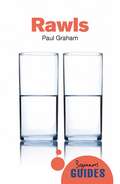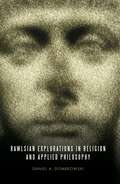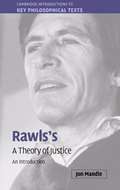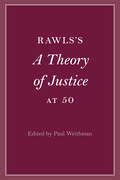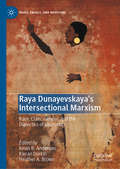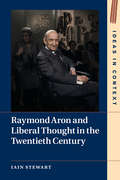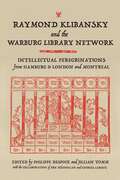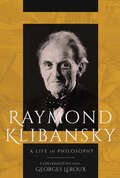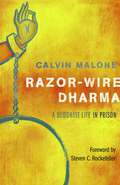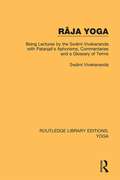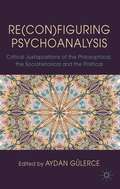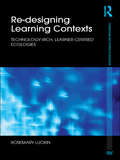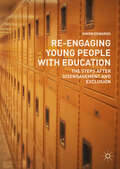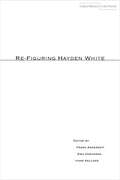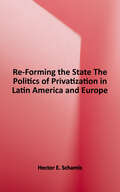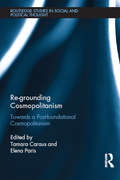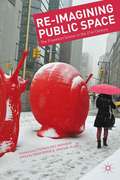- Table View
- List View
Rawls and Habermas
by Todd HedrickThis book offers a comprehensive evaluation of the two preeminent post-WWII political philosophers, John Rawls and Jürgen Habermas. Both men question how we can be free and autonomous under coercive law and how we might collectively use our reason to justify exercises of political power. In pluralistic modern democracies, citizens cannot be expected to agree about social norms on the basis of common allegiance to comprehensive metaphysical or religious doctrines concerning persons or society, and both philosophers thus engage fundamental questions about how a normatively binding framework for the public use of reason might be possible and justifiable. Hedrick explores the notion of reasonableness underwriting Rawls's political liberalism and the theory of communicative rationality that sustains Habermas's procedural conception of the democratic constitutional state. His book challenges the Rawlsianism prevalent in the Anglo-American world today while defending Habermas's often poorly understood theory as a superior alternative.
Rawls and Religion
by Tom Bailey Gentile ValentinaEstablished scholars of Rawls and the philosophy of religion reexamine and rearticulate the central tenets of Rawls's theory
Rawls and Religion
by Tom Bailey Valentina GentileJohn Rawls's influential theory of justice and public reason has often been thought to exclude religion from politics, out of fear of its illiberal and destabilizing potentials. It has therefore been criticized by defenders of religion for marginalizing and alienating the wealth of religious sensibilities, voices, and demands now present in contemporary liberal societies.In this anthology, established scholars of Rawls and the philosophy of religion reexamine and rearticulate the central tenets of Rawls's theory to show they in fact offer sophisticated resources for accommodating and responding to religions in liberal political life. The chapters reassert the subtlety, openness, and flexibility of his sense of liberal "respect" and "consensus," revealing their inclusive implications for religious citizens. They also explore the means he proposes for accommodating nonliberal religions in liberal politics, developing his conception of "public reason" into a novel account of the possibilities for rational engagement between liberal and religious ideas. And they reevaluate Rawls's liberalism from the "transcendent" perspectives of religions themselves, critically considering its normative and political value, as well as its own "religious" character. Rawls and Religion makes a unique and important contribution to contemporary debates over liberalism and its response to the proliferation of religions in contemporary political life.
Rawls's Egalitarianism
by Alexander KaufmanThis is a new interpretation and analysis of John Rawls's leading theory of distributive justice, which also considers the responding egalitarian theories of scholars such as Richard Arneson, G. A. Cohen, Ronald Dworkin, Martha Nussbaum, John Roemer, and Amartya Sen. Rawls's theory, Kaufman argues, sets out a normative ideal of justice that incorporates an account of the structure and character of relations that are appropriate for members of society viewed as free and equal moral beings. Forging an approach distinct amongst contemporary theories of equality, Rawls offers an alternative to egalitarian justice methodologies that aim primarily to compensate victims for undeserved bad luck. For Rawls, the values that ground the most plausible account of egalitarianism are real equality of economic opportunity combined with the guarantee of a fair distribution of social goods. Kaufman's analysis will be of interest to scholars and advanced students of political theory and political philosophy, particularly those working on justice, and on the work of John Rawls.
Rawls's Political Liberalism (Columbia Themes in Philosophy)
by Martha C. Nussbaum Thom BrooksWidely hailed as one of the most significant works in modern political philosophy, John Rawls's Political Liberalism (1993) defended a powerful vision of society that respects reasonable ways of life, both religious and secular. These core values have never been more critical as anxiety grows over political and religious difference and new restrictions are placed on peaceful protest and individual expression.This anthology of original essays suggests new, groundbreaking applications of Rawls's work in multiple disciplines and contexts. Thom Brooks, Martha Nussbaum, Onora O'Neill (University of Cambridge), Paul Weithman (University of Notre Dame), Jeremy Waldron (New York University), and Frank Michelman (Harvard University) explore political liberalism's relevance to the challenges of multiculturalism, the relationship between the state and religion, the struggle for political legitimacy, and the capabilities approach. Extending Rawls's progressive thought to the fields of law, economics, and public reason, this book helps advance the project of a free society that thrives despite disagreements over religious and moral views.
Rawls, Citizenship, and Education
by M. Victoria CostaThis book develops and applies a unified interpretation of John Rawls’ theory of justice as fairness in order to clarify the account of citizenship that Rawls relies upon, and the kind of educational policies that the state can legitimately pursue to promote social justice. Costa examines the role of the family as the "first school of justice" and its basic contribution to the moral and political development of children. It also argues that schools are necessary to supplement the education that families provide, teaching the political virtues that support just social institutions. The book also examines the questions of whether civic education should aim at cultivating patriotic feelings, and how it should respond to the deep cultural pluralism of contemporary democratic societies.
Rawls, Political Liberalism and Reasonable Faith
by Paul WeithmanFor over twenty years, Paul Weithman has explored the thought of John Rawls to ask how liberalism can secure the principled allegiance of those people whom Rawls called 'citizens of faith'. This volume brings together ten of his major essays (including one new unpublished essay), which reflect on the task and political character of political philosophy, the ways in which liberalism does and does not privatize religion, the role of liberal legitimacy in Rawls's theory, and the requirements of public reason. The essays reveal Rawls as a thinker deeply engaged with political and existential questions that trouble citizens of faith, and explore how - in firm opposition to political realism - he tries to show that the possibility of liberal democracy and the natural goodness of humanity are objects of reasonable faith. The volume will be of interest to political philosophers, political theorists, moral theologians, and religious ethicists.
Rawls-Handbuch: Leben – Werk – Wirkung
by Michael Reder Johannes J. Frühbauer Michael Roseneck Thomas M. SchmidtMit seiner Theorie der Gerechtigkeit löste John Rawls (1921–2002) eine Renaissance der normativen politischen Theorie aus, da sie Fragen nach der gerechten Verteilung von Gütern und Chancen wieder als eine zentrale philosophische Aufgabe ernst nahm. Es gilt als eines der einflussreichsten Werke der politischen Philosophie des 20. Jahrhunderts und kann nach wie vor als konstruktiver Beitrag zu aktuellen Diskussionen um Verteilungsgerechtigkeit gesehen werden. Mit seinem zweiten Hauptwerk Politischer Liberalismus hat er die Debatte eröffnet, wie wir unter Bedingungen einer pluralistischen Gesellschaft auf vernünftige Weise gemeinsam leben können. Das Werk von Rawls besitzt eine zentrale Bedeutung für die politische Philosophie der Gegenwart und für angrenzende Disziplinen wie Sozialwissenschaften, Rechtswissenschaften oder Theologie. Das Handbuch ist das erste deutschsprachige Nachschlagewerk, welches auf dem aktuellen internationalen Forschungsstand das Gesamtwerk von Rawls in seiner Entwicklung darstellt, zentrale Begriffe erläutert und zudem die wichtigsten Referenzen und Diskussionen vorstellt.
Rawls: A Beginner's Guide (Beginner's Guides)
by Paul GrahamWhat is justice? How can we know it? Harder still, how can we implement it? Combining lucid exposition with thought-provoking criticism, Paul Graham gives us the first introduction to Rawls' work that encompasses his entire career - from his early articles in the 1950s to his death in 2002. The most significant political philosopher since John Stuart Mill, Rawls' Theory of Justice sold over 250,000 copies and has been translated into 20 languages. His presentation of social justice, and particularly his contention that how we organize society should rectify undeserved inequality rather than ratify it, has been the source not only of academic argument but of political debate and legislative reform. Covering the most interesting and important aspects of Rawls' work in a stimulating manner, this study is essential reading for students, scholars, and interested readers alike.
Rawlsian Explorations in Religion and Applied Philosophy (G - Reference, Information and Interdisciplinary Subjects)
by Daniel A. DombrowskiTo probe the underlying premises of a liberal political order, John Rawls felt obliged to use a philosophical method that abstracted from many of the details of ordinary life. But this very abstraction became a point of criticism, as it left unclear the implications of his theory for public policies and life in the real political world. Rawlsian Explorations in Religion and Applied Philosophy attempts to ferret out those implications, filling the gap between Rawls’s own empyrean heights and the really practical public policy proposals made by government planners, lobbyists, and legislators. Among the topics examined are natural rights, the morality of war, the treatment of mentally deficient humans and nonhuman sentient creatures, the controversies over legacy and affirmative action in college admissions, and the place of religious belief in a democratic society. The final chapter explores how Rawls’s own religious beliefs, as revealed in two works posthumously published in 2009, played into his formulation of his theory of justice.
Rawls’s A Theory Of Justice
by Jon MandleA Theory of Justice, by John Rawls, is widely regarded as the most important twentieth-century work of Anglo-American political philosophy. It transformed the field by offering a compelling alternative to the dominant utilitarian conception of social justice. The argument for this alternative is, however, complicated and often confusing. In this book Jon Mandle carefully reconstructs Rawls's argument, showing that the most common interpretations of it are often mistaken. For example, Rawls does not endorse welfare-state capitalism, and he is not a 'luck egalitarian' as is widely believed. Mandle also explores the relationship between A Theory of Justice and the developments in Rawls's later work, Political Liberalism, as well as discussing some of the most influential criticisms in the secondary literature. His book will be an invaluable guide for anyone seeking to engage with this ground-breaking philosophical work.
Rawls’s A Theory of Justice at 50 (Cambridge Philosophical Anniversaries)
by Paul WeithmanIn 1971 John Rawls's A Theory of Justice transformed twentieth-century political philosophy, and it ranks among the most influential works in the history of the subject. This volume of new essays marks the 50th anniversary of its publication with a multi-faceted exploration of Rawls's most important book. A team of distinguished contributors reflects on Rawls's achievement in essays on his relationship to modern political philosophy and 20th-century economic theory, on his Kantianism, on his transition to political liberalism, on his account of public reason and contemporary challenges to it, on his theory's implications for problems of racial justice, on democracy and its fragility, and on Rawls's enduring legacy. The volume will be valuable for students and scholars working in moral and political philosophy, political theory, legal theory, and religious ethics.
Raya Dunayevskaya's Intersectional Marxism: Race, Class, Gender, and the Dialectics of Liberation (Marx, Engels, and Marxisms)
by Kevin B. Anderson Kieran Durkin Heather A. BrownRaya Dunayevskaya is one of the twentieth century’s great but underappreciated Marxist and feminist thinkers. Her unique philosophy and practice of Marxist-Humanism—as well as her grasp of Hegelian dialectics and the deep humanism that informs Marx’s thought—has much to teach us today. From her account of state capitalism (part of her socio-economic critique of Stalinism, fascism, and the welfare state), to her writings on Rosa Luxemburg, Black and women’s liberation, and labor, we are offered indispensable resources for navigating the perils of sexism, racism, capitalism, and authoritarianism. This collection of essays, from a diverse group of writers, brings to life Dunayevskaya’s important contributions. Revisiting her rich legacy, the contributors to this volume engage with her resolute Marxist-Humanist focus and her penetrating dialectics of liberation that is connected to Black, labor, and women’s liberation and to struggles over alienation and exploitation the world over. Dunayevskaya’s Marxist-Humanism is recovered for the twenty-first century and turned, as it was with Dunayevskaya herself, to face the multiple alienations and de-humanizations of social life.
Raymond Aron and Liberal Thought in the Twentieth Century (Ideas in Context #124)
by Iain StewartRaymond Aron is widely regarded as the most important figure in the history of twentieth-century French liberalism. Yet his status within the history of liberal thought has been more often proclaimed than explained. Though he is frequently lauded as the inheritor of France's liberal tradition, Aron's formative influences were mostly non-French and often radically anti-liberal thinkers. This book explains how, why, and with what consequences he belatedly defined and aligned himself with a French liberal tradition. It also situates Aron within the larger histories of Cold War liberalism and decolonization, re-evaluating his contribution to debates over totalitarianism, the end of ideology, and the Algerian War. By exposing the enduring importance of Aron's student political engagements for the development of his thought, Iain Stewart challenges the prevailing view of Aron's early intellectual trajectory as a journey from naïve socialist idealism to mature liberal realism, offering a new critical perspective on one of the twentieth century's most influential intellectuals.
Raymond Klibansky and the Warburg Library Network: Intellectual Peregrinations from Hamburg to London and Montreal
by Philippe Despoix and Jillian TommA new approach to the legacy of the Warburg Library and a companion to the pioneering work Saturn and Melancholy.
Raymond Klibansky: A Life in Philosophy
by Georges Leroux Raymond KlibanskyBorn in Paris in 1905 to a German-Jewish family from Frankfurt and dying a century later in Montreal, Raymond Klibansky lived a life indelibly coloured by the history of the twentieth century. His thought shaped and was shaped by intellectual currents both European and American, and his scholarly work entailed an intellectual reckoning with tradition that was unique in its scope and ambition, long before talk of academic interdisciplinarity.Klibansky, a student of Karl Jaspers and Ernst Cassirer, was educated in the liberal milieu of the Weimar Republic. Forced to emigrate from Germany in 1933, Klibansky spent the war years in London, where he participated in the British war effort. Working in the tradition established by Aby Warburg and the Warburg Library, he completed with Erwin Panofsky and Fritz Saxl the German text of Saturn and Melancholy. The book’s cast metal type was reclaimed for the war effort before it could be printed, but it was eventually published in English in 1964 and has deeply influenced understandings of the interrelations between humanities disciplines ever since. After the war Klibansky came to McGill University, where he enjoyed a brilliant career as a scholar of platonic studies and the history of ideas, mainly in the works of Locke and Hume. Over twelve chapters, each devoted to questions that were dear to Klibansky during his long life, Georges Leroux presents dialogues with his mentor selected from decades of conversation, exploring themes including philosophical traditions, melancholy, tolerance, peace, and the role of philosophy in international relations. Scholarship, interlinked with the events of a turbulent century, is at the centre of these fascinating conversations between student and teacher.A richly illustrated autobiography through dialogue, Raymond Klibanskyis a portrait of a heroic figure in twentieth-century philosophy, a model for a younger generation who can find in his scholarship an admirable example of virtue in the service of peace.
Razor-Wire Dharma
by Calvin Malone Sunyana Graef Steven C RockefellerCalvin Malone has plenty to teach us all about ideas that we rarely associate with the penal system: Dignity. Compassion. Freedom behind bars. He speaks from experience: Malone is nearing the end of a 20-year prison sentence himself.Razor-Wire Dharma is his eloquent, enlightening, and utterly inspiring personal story how he found Buddhism--and real, transformative meaning for his life-despite being in one of the world's harshest environments.Some of his stories are hilarious, some are harrowing, but all express Buddhist wisdom as vividly as any practitioner could hope to do. Malone is living it, and in the unlikeliest of places. For him, the choice of staying true to his principles often requires that he quite literally jeopardize his life, safety, and the few small comforts available to him to try to do what's right.Razor-Wire Dharma makes it clear that if Calvin can do what's right in jail, he can do it anywhere. What's more, it proves that we can, too.
Râja Yoga: Being Lectures by the Swâmi Vivekananda, with Patanjali's Aphorisms, Commentaries and a Glossary of Terms (Routledge Library Editions: Yoga #7)
by Swâmi VivekanandaThis book, first published in 1922, examines the science of Râja Yoga. All the orthodox systems of Indian philosophy point to one goal, the liberation of the soul through perfection – and the method to attain this is through Yoga. This book presents lectures on Yoga, delivered to a western audience view to explaining Indian philosophy; the lectures are accompanied by the Sutras (aphorisms) of Patanjali, along with an explanatory commentary.
Re(con)figuring Psychoanalysis: Critical Juxtapositions of the Philosophical, the Sociohistorical and the Political
by Aydan GülerceLeading international scholars present novel dialogues between different psychoanalytic orientations as well as between the particularities of diverse socio-cultural and historical contexts in order to offer critical insights which are highly relevant to the current intellectual debates and social praxis.
Re-Designing Learning Contexts: Technology-Rich, Learner-Centred Ecologies (Foundations and Futures of Education)
by Rosemary LuckinWhat do we mean by the word ‘context’ in education and how does our context influence the way that we learn? What role can technology play in enhancing learning and what is the future of technology within learning? Re-Designing Learning Contexts seeks to re-dress the lack of attention that has traditionally been paid to a learner’s wider context and proposes a model to help educators and technologists develop more productive learning contexts. It defines context as the interactions between the learner and a set of inter-related resource elements that are not tied to a physical or virtual location. Context is something that belongs to an individual and that is created through their interactions in the world. Based on original, empirical research, the book considers the intersection between learning, context and technology, and explores: the meaning of the concept of context and it’s relationship to learning the ways in which different types of technology can scaffold learning in context the Learner-Centric ‘Ecology of Resources’ model of context as a framework for designing technology-rich learning environments the importance of matching available resources to each learner’s particular needs the ways in which the learner’s environment and the technologies available might change over the coming years the potential impact of recent technological developments within computer science and artificial intelligence. This interdisciplinary study draws on a range of disciplines, including geography, anthropology, psychology, education and computing, to investigate the dynamics and potential of teacher-learner interaction within a learning continuum, and across a variety of locations. It will be of interest to those teaching, researching and thinking about the use of technology in learning and pedagogy, as well as those involved in developing technology for education and those who use it in their own teaching. For practical examples of the way the Ecology of Resources framework has been used visit: http://eorframework.pbworks.com.
Re-Engaging Young People with Education: The Steps after Disengagement and Exclusion
by Simon EdwardsThis book examines how young people can be re-engaged with schooling and their own learning beyond the school gates. Despite attempts by successive UK governments to promote engagement with education, there has been a substantial increase in formal and informal exclusions from secondary schools, particularly of underperforming students who come from low income families. The book builds on an ethnographic study carried out in a youth centre based on a secondary school site, exploring the social and cultural worlds of fourteen students as they complete a GCSE teamwork assessment. Analysing the ‘translation’ process of the students as they relocate their understanding of teamwork into the language of assessment, the author posits that student identity is a holistic individual project, where knowledge is produced within the conditions for the production of the self-narrative. This volume calls to educators to recognise the importance of relational pedagogy rooted in social practices, rather than individual cognitive performance. It is sure to be of value and interest to students and scholars of exclusion in education and relational pedagogy, as well as practitioners and policy makers.
Re-Figuring Hayden White (Cultural Memory in the Present)
by Frank Ankersmit, Ewa Domańska, Hans KellnerProduced in honor of White's eightieth birthday, Re-Figuring Hayden White testifies to the lasting importance of White's innovative work, which firmly reintegrates historical studies with literature and the humanities. The book is a major reconsideration of the historian's contributions and influence by an international group of leading scholars from a variety of disciplines. Individual essays address the key concepts of White's intellectual career, including tropes, narrative, figuralism, and the historical sublime while exploring the place of White's work in the philosophy of history, postmodernism, and ethics. They also discuss his role as historian and teacher and apply his ideas to specific historical events.
Re-Forming the State: The Politics of Privatization in Latin America and Europe (Interests, Identities And Institutions In Comparative Politics Ser.)
by Hector E. SchamisWith evidence drawn from Argentina, Chile, Mexico, Great Britain, and Hungary, Re-forming the State examines the processes leading to, and the political effects of, market reform experiments and focuses specifically on the patterns of collective action and coalition building that drive privatization. The author's argument calls into question established approaches in the discipline of economics and in the fields of comparative and international political economy. The experience of privatization shows that the public and the private are neither contradictory nor mutually exclusive spheres and that power relations between them are not necessarily zero-sum. To stress the point, the author borrows from the literature on state formation, which has extensively examined the historical processes of key private groups. The evidence presented shows why and how, by restructuring coalitional and institutional arenas, the state uses marketization to generate political order and distribute political power. Thus, the author specifies the conditions under which political change is conceived in terms of and channeled through economic policy; in other words, how the state is "re-formed" through privatization. Re-forming the State thus highlights how privatization is simultaneously a movement from public to private, but also a movement from non-state to state, as the reduction of state assets leads to institutional changes that increase state capacities for defining and enforcing property rights, extracting revenue, and centralizing administrative and political resources. Hector E. Schamis is an Assistant Professor of Government, at Cornell University.
Re-Grounding Cosmopolitanism: Towards a Post-Foundational Cosmopolitanism (Routledge Studies in Social and Political Thought)
by Tamara Caraus Elena ParisLeading experts and rising stars in the field explore whether cosmopolitanism becomes impossible in the theoretical framework that assumed the absence of a final ground. The questions that the volume addresses refer exactly to the foundational predicament that characterizes cosmopolitanism: How is it possible to think cosmopolitanism after the critique of foundations? Can cosmopolitanism be conceived without an 'ultimate' ground? Can we construct theories of cosmopolitanism without some certainties about the entire world or about the cosmos? Should we continue to look for foundations of cosmopolitan rights, norms and values? Alternatively, should we aim towards cosmopolitanism without foundations or towards cosmopolitanism with 'contingent foundations'? Could cosmopolitanism be the very attempt to come to terms with the failure of ultimate grounds? Written accessibly and contributing to key debates on political philosophy, and social and political thought, this volume advances the concept of post-foundational cosmopolitanism by bridging the polarised approaches to the concept.
Re-Imagining Public Space
by Diana Boros James M. GlassWith a foreword by Stephen Bronner, this volume edited by Diana Boros and James Glass consists of reflections from contemporary political and social theorists on the concept of public space and what it means in the context of modern political life. The contributors lay the foundation for thinking about public space, moving beyond historical analyses of Frankfurt School theorists to offer a new perspective on how to think about public space, how to theorize its implications, and how to construct a theory of democratic political life through political action that takes seriously how politics workwithin the public space. The contributors, including Douglas Kellner, David Ingram, Lauren Langman, Lars Rensmann, Michael Thompson, Michael Diamond, C. Fred Alford, Mary Caputi, and Malcolm Miles, come from a variety of scholarly backgrounds but all are in agreement that a democratic politics will not be viable in protecting rights, tolerance, and freedom unless it is grounded in a theory that embraces participation in public life, as well as art and protest as democratic action in the public space
